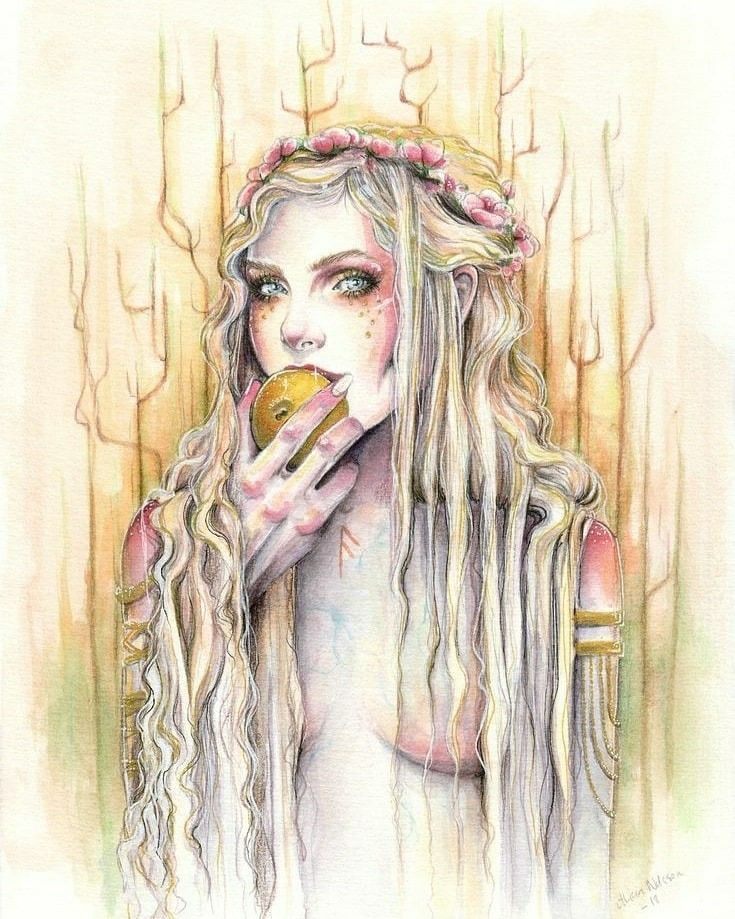The Goddess Idunn
- Folkish Odinism Dorset
- Aug 8, 2020
- 3 min read
Updated: Nov 28, 2020
Iðunn is the wife of and muse to Bragi, the god of poetry and the daughter of the dwarf Ivald. She is entrusted with the golden apples of eternal youth, which the gods must feed on so as not to grow old: she therefore has the power over the life-giving and regenerative forces in her hands. So much information is lost regarding Idunn but we do know from Eddic texts that she is one of the most ancient Gods of Elven lineage. Historians tell us that the language used in poems that mention Idunn is often very archaic which adds weight to the idea that Idunn is a very old Goddess. Whilst the Prose Edda describes Idunn as Aesir, the fact that she is of Elven lineage, a Goddess of fertility and nature suggests she may have been more like the Vanir Gods.
Her name possibly means “rejuvenating one,” “rejuvenator” or “ever-young.” Poetic Kennings for her name are about springs or eddys of water. She is depicted as a summery maiden goddess adorned with blossoms, bearing fruit, and tending her gardens. Idunn is often compared to Eostre in the Anglo Saxon pantheon. Idunn is sister to the Goddess Nanna who is married to baldr. The Setre Comb, a comb discovered by archaeologists dated from the 6th or early 7th century featuring runic inscriptions mentions Nanna.
Like Freya, she is described as golden, and is coveted by the giants, who routinely barter with the Aesir, demanding her for a bride. Surprisingly, it is Iðunn, and not her apples, that the giants seem to want. A popular story about Iðunn tells of her abduction by the giant Þjazi (storm demon / father) in eagle-looking form. The kidnapping of Idunn which comes to us from the skaldic poem Haustlöng and the prose Edda. The elven apples, which Skírnir offers to the giant Gerðr to induce her to give in to Freyr's love, are probably the apples of Iðunn (Skírnismál 19-20).
You might recognise her name from the fake xtian garden of 'Eden' stories. The original garden of 'Eden' story used a fig rather than an apple as the fruit of temptation. The old texts clearly talk of the fruit coming from a fig tree. When xtianity first started floating around Europe the garden of 'Eden' wasn't called 'Eden'. This name was taken from our Goddess Idunn to help European folk get used to the new xtian ideas.
Intriguingly, Iðunn also resembles Hebe, the Grecian goddess of youth, who dwelt in the garden of the Hesperides, a celestial orchard, west-of-west, where the golden apples of immortality grew. Hebe served to the gods of Olympus ambrosia, a divine nectar which kept them ever-young.
Iðunn may also be related to Nimue, the celtic maiden-enchantress in Malory’s Mort D’Arthur, who dwells on Avalon, “land of apples,” which lies west of west, and where one can regenerate from even mortal wounds. We should note that DNA analysis indicates that apples originated in the mountains of Kazakhstan, where the wild Malus sieversii—the many-times great-grandparent of Malus domestica, the modern domesticated apple—still flourishes. This area is also near to the birthplace of the modern European e.g. our P.I.E. / Aryan ancestors spread out through Europe from the Steppes of Russia and Ukraine which are close by. Whilst it is interesting to look at these similarities with the Goddesses of other tribes that we share a heritage with, we will always honor Idunn as she is and how we know her.
Hail Idunn FFF






Comments